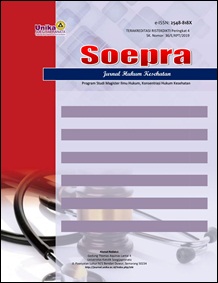The Legal Power in Evidence of Electronic Medical Records As A Substitute for A Doctor's Signature
Abstract
The existence of related regulations regarding validity of Electronic Medical Record (EMR) in proving a case explained that it requires a signature in proving an EMR. The use of a personal identification number (PIN) only performs a verification function, not someone's authentication.UU No. 29 of 2004 regarding Medical Practice states that it is sufficient to replace the obligation to sign an EMR with a Personal Identification Number (PIN), while in Permenkes Medical Records 2022, it is expanded by granting access rights to certain people where the security system depends on the decision of the leadership of each health care facility and can be equipped with an Electronic Signature. The use of a PIN alone is considered insufficient form EMR authentication functions, so other options need to be raised such as Electronic Signature which carry out both verification and authentication functions. The aims of research were to find out how the legality and strength of evidence of PIN and Electronic Signature as substitution of doctor’s signature on electronic medical records. This study used a normative juridical method, with two approaches, namely statutory and conceptual approaches. The results showed that PIN and Electronic Signature could legally replace a doctor’s signature on EMR, but hada different strength as evidence. The strength of EMR as evidence depends on the judge’s point of view which is influenced by validity of EMR evidence, namely the presence/absence of a PIN and electronic signature as a function of verification and authentication.
Keywords
Biometric, Evidence, Electronic, Medical Record and Verification
Full Text:
PDFDOI: https://doi.org/10.24167/sjhk.v10i1.11227
Refbacks
- There are currently no refbacks.
Copyright (c) 2024 SJHK Soepra Jurnal Hukum Kesehatan







